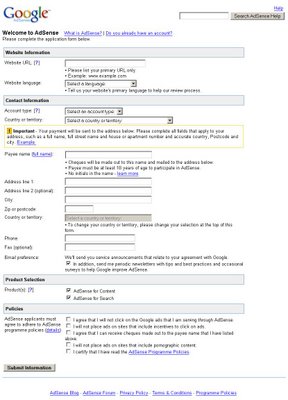Once you are accepted into the AdSense program you can decide whether you want to use AdSense for Search, AdSense for Content, referrals or a combination of all three. So what do these three options entail?
AdSense for Content:
This is the common format you'll have seen many times before - the traditional 'Ads by Goooogle' boxed adverts and links. You choose from a wide range of ad formats, change the colours to meet your requirements and paste an HTML code into your web page. Google crawl your site for key words and match the ads accordingly. Every time a visitor clicks on one of the 'Ads by Goooogle' you receive a small payment, usually in the range USD0.20 to USD2.00.
AdSense for Search:
This option allows you to place a Google search bar on your site. A site visitor can use the search bar to search your site and/or the web depending on how you set it up. If they choose to search the web and click a sponsored link on the search results page you will receive a small payment.
Referrals:
This option allows you to place referral buttons on your site. The buttons advertise things like Mozilla Firefox, Picasa, Google AdSense and Google Toolbox. When someone clicks on a button and installs the program associated with it you receive a small payment.
AdSense for Content:
This is the common format you'll have seen many times before - the traditional 'Ads by Goooogle' boxed adverts and links. You choose from a wide range of ad formats, change the colours to meet your requirements and paste an HTML code into your web page. Google crawl your site for key words and match the ads accordingly. Every time a visitor clicks on one of the 'Ads by Goooogle' you receive a small payment, usually in the range USD0.20 to USD2.00.
AdSense for Search:
This option allows you to place a Google search bar on your site. A site visitor can use the search bar to search your site and/or the web depending on how you set it up. If they choose to search the web and click a sponsored link on the search results page you will receive a small payment.
Referrals:
This option allows you to place referral buttons on your site. The buttons advertise things like Mozilla Firefox, Picasa, Google AdSense and Google Toolbox. When someone clicks on a button and installs the program associated with it you receive a small payment.
